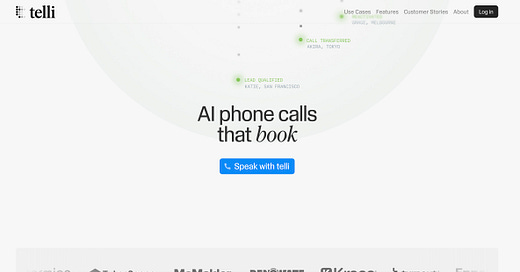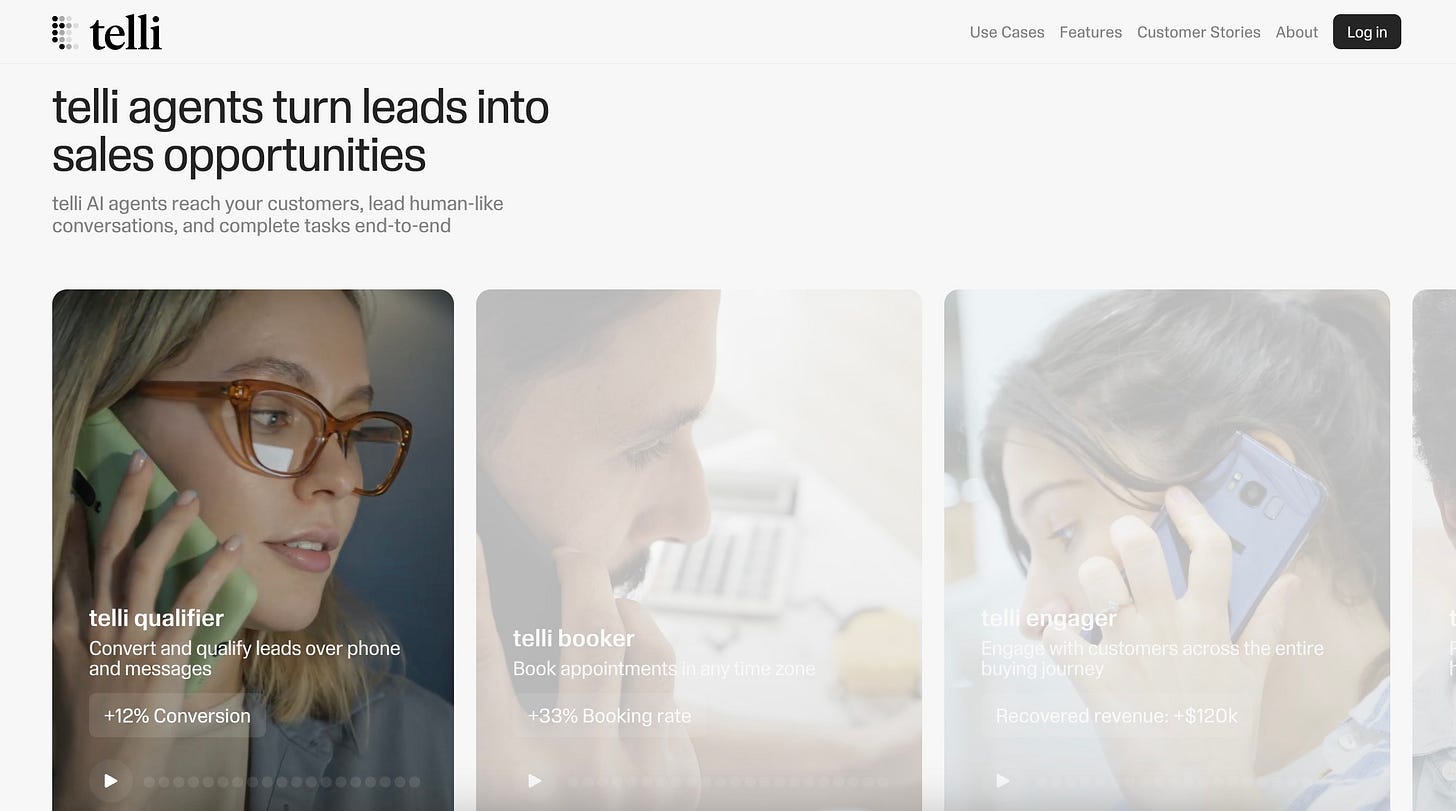Make AI Work is a new newsletter brought to you by Future Work/Life, helping non-technical, AI-curious folks like you understand how AI can help you build great teams and careers. If you find it interesting, please share it!
So far in this Make AI Work series, we've heard from:
Sam Mallikarjunan at Agent.ai, who explained that AI agents are "pieces of software that can take action autonomously on your behalf" and showed how they can be built by non-technical people using familiar workflow tools.
Alex Kantjas at 9x, who cautioned that most businesses haven't mastered basic automation yet and that today's AI agents are more "task monkeys" than strategic thinkers.
Flo Crivello at Lindy, who shared his bold vision of "a full-blown AI employee that can do anything a regular human employee can do, but 100x faster, 100x cheaper, 100x more reliable."
This week, we're exploring how AI agents are handling real-world conversations with Finn zur Mühlen, co-founder of telli, a company whose AI agents are already making thousands of sales calls.
When AI speaks to your customers
"You can think of it really as hiring a new team member to your team that can complete tasks end to end and you don't have to think about them."
That's how Finn defines an AI agent, and it's a definition with practical implications.
His company, telli, is already handling real phone conversations with real customers for companies across Europe.
telli was conceived after when Finn and his co-founders were managing a rapidly growing team at Enpal, Europe's largest solar installation company, they faced a problem familiar to many businesses - an overwhelming volume of phone-based interactions.
“We had to manage 50-60 people that were only doing calls like appointment bookings and qualification calls. The existing tools for human [customer service] agents suck, but there's also no good solution for these kinds of companies to integrate newer technologies like AI agents.”
What AI agents can already do today
While science fiction might have us imagining AI capable of handling any conversation, the reality is currently more focused. But still impressive. At telli, AI agents currently excel at specific, constrained tasks:
Qualification calls: Gathering key information from customers
Warm outbound calls: Following up with website leads
Appointment booking: Scheduling meetings with sales teams
For example, one of telli's customers is a large real estate platform. When someone expresses interest in a property, an AI agent calls them within minutes to gather more information and schedule a viewing.
What's particularly interesting is how customers are responding:
"We get three times the engagement. They talk to the AI agent much longer than to a human."
Why?
Because unlike human agents who might be rushing to their next call, AI agents have unlimited time. They can patiently discuss property details, answer questions, and engage with the customer for as long as needed.
Beyond automation: The Human+AI hybrid workforce
The conversation inevitably turns to the question I’ve been asking everyone building in this space. Will agents replace human hobs?
"With our customers right now, we have not replaced anybody. But they have switched to different tasks and positions."
This points to an emerging model - a hybrid workforce where AI handles routine interactions while humans focus on more complex or higher-value work.
“The conversations in the second step are getting much longer because these agents that have been doing both before have much more time for the customers in the later funnels. So the conversion is actually increased.”
In other words, by offloading initial qualification calls to AI, sales representatives can spend more time with promising leads, ultimately improving conversion rates.
The customer experience: More human than you might think
One surprising aspect of telli's approach is just how natural these AI conversations feel.
Their agents introduce themselves as digital assistants (e.g., "Hi, this is Hannah, your digital assistant"), but the experience is so seamless that many customers don't even notice.
“There are many customers that have not realised they've been talking to an AI. That could have happened to your listeners or newsletter readers as well, that they have talked to someone and they have not realised it's an AI agent.”
Unlike the frustrating IVR (interactive voice response) systems we've all experienced ("Press 1 for..."), these agents engage in natural conversation, adapt to the customer's needs, and focus on creating positive outcomes.
“In the end, if the first point of contact is an AI agent that actually can solve your problem and create an outcome that you want, I think that's the best customer experience.”
How to implement AI agents successfully
Based on telli's experience, here are key insights for businesses considering AI agents:
Have established processes first: “You have to have some form of processes already that you can integrate into.”
Assign clear ownership: “It can only work if someone in the company actually is a driving force and says, 'We want to implement this.'“
Plan for an iterative process: “It's not like you go live on day one and it works like magic. It's more like, 'How do we iteratively move the agent forward to hit your metrics after a month or so?'“
Extract implicit knowledge: “At least 50 percent of the information is implicit, so it's not written down – it's in the heads of the people actually doing the job.”
This last point is particularly crucial.
Successfully implementing AI agents requires interviewing your team to extract the tacit knowledge that makes your business work. As you might expect, Finn envisions a future where this process itself is AI-assisted:
“One of our AI agents is talking to them, interviewing them, and getting the information out, so they don't have to write it down.”
What you can do today
Identify constrained conversations: Look for structured, repetitive calls that follow a clear pattern – these are prime candidates for AI agents.
Document your implicit knowledge: Start capturing the unwritten rules your team follows when interacting with customers.
Consider a hybrid approach: AI agents don't have to handle everything – they can complement your human team by taking on specific tasks.
Stay curious and experiment: As Finn advises, "Be curious, explore the technology as an individual... that just drives creativity and then you get ideas for how to implement this into the business."
The future of work or just another tool?
So, rounding off this month’s exploration of AI agents, while we're not yet at the "full-blown AI employee" that Flo Crivello envisions, specific applications are already delivering tangible value.
And the most successful implementations share a common thread: they're focused on clearly defined tasks where AI can excel, while leaving room for us to bring a bit of human-ness - adding the skills that AI can’t. Because, at least for now, we’re not talking wholesale replacement, but augmentation. And potentially even creating space for deeper human connections where and when they matter most.
Have a great weekend,
Ollie






